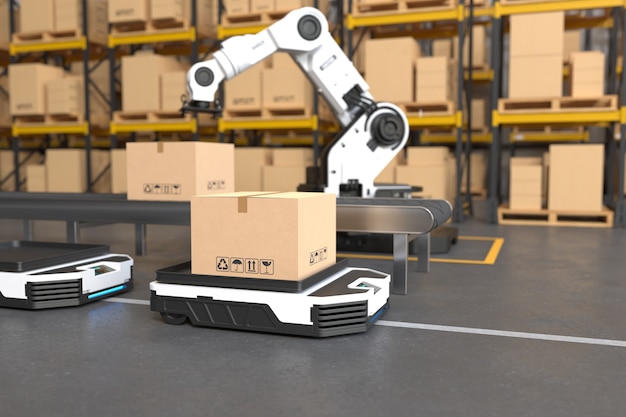In today’s highly interconnected world, global supply chains are the lifeblood that interconnect manufacturers, suppliers, and consumers across continents. These intricate networks ensure products are produced in an efficient and timely manner, thereby meeting the market’s needs. However, managing such extensive and complex systems poses great challenges, including logistical hurdles, cost management, and risk mitigation. The manufacturing industry is increasingly using automation as a transformative solution for these complexities.
Evolution of Automation in Manufacturing
From simple mechanization to advanced and intelligent systems, automation in manufacturing has evolved. Initial days of manufacturing process automation with machines for repetitive jobs that eliminated most human labor and increased the rate of production saw the light.But now, through AI, automation is through real-time machines analyzing data and making decisions in processes. This has made it one of the integral pillars of a globally efficient supply chain; hence, the manufacturers are extremely responsive to shifting market conditions and consumer demands.
How Automation is Reshaping Supply Chains
- Speed & Scalability: Automation accelerates production processes, allowing manufacturers to scale operations up or down based on demand. Automated systems can operate 24/7 without fatigue, ensuring rapid production cycles and quicker time-to-market.
- Cost Optimization: Automation saves on labor cost and reduces the possibility of human error. Further, automation also optimizes energy consumption and material waste through better control and monitoring.
- Predictive Analytics & Demand Forecasting: AI models process huge amounts of data to predict the trend of markets as well as for understanding customer behavior. It gives proper products at the right times and thus eliminates overstock as well as probable stockouts.
- Global Supply Chain Resilience: The automation of supply chains makes it more resilient, avoiding risks like delays and shortages. Automated systems can quickly respond to disruptions by rerouting processes or sourcing alternatives without much human intervention.
Role of Robotics, AI, and IoT in Supply Chain Automation
- AI-Powered Decisions: the optimization of route selection, operations of warehouse through predictive analytics about logistics, so all decisions processed by algorithms make it efficient as well as effective and not costing too much.
- Robotic Process Automation: RPA automates simple and repetitive tasks involving order processing within production and distribution and inventory update into computer-based workflow that sets free the human staff to work on complicated tasks.
- IoT & Smart Factories The Internet of Things (IoT) connects the devices and the machinery, thus making it possible to monitor everything in real-time and self-regulate. Through IoT, smart factories collect data from different production stages, hence making proactive maintenance and process optimization possible.
Challenges in Adopting Manufacturing Automation
Though the advantages are humongous, implementing automation in manufacturing is not without its drawbacks:
- Initial investment vs. long-term return on investment. The cost of installation for an automated system is high, and usually, such costs pay off into long-term returns through savings in efficiency and reduction in operational costs.
- Workforce Transformation: Automation will require upskilling employees to work as intently in many areas as with advanced technologies. Training programs are essential to arm the workforce with required skills to manage and maintain automated systems.
- Cybersecurity & Data Privacy: With increased connectivity comes the risk of cyber threats. Protecting automated supply chains from digital attacks requires robust cybersecurity measures and protocols to safeguard sensitive data.
Future of Manufacturing Automation
Eventually, the future of manufacturing automation will embrace the arrival of trends related to AI-based logistics, autonomous supply chains, and sustainable automation practices. Automation, in particular, will contribute the most toward an efficient reduction of carbon footprint when it optimizes resource usage as well as manages waste at each step. Continuous advancements in these automation technologies could make supply chains more intelligent and responsive in years to come-a decade, possibly.
Conclusion
Manufacturing automation has dramatically changed the dynamics of supply chains across the world by maximizing efficiency, cost minimization, and resilience. Now, due to the ongoing trend of changing and evolving this industry, no firm can resist its adoption without jeopardizing business operations in an ever-competitive global market.
Contact Novus Hi-Tech for Cutting-Edge Automation Solutions
At Novus Hi-Tech, we specialize in providing state-of-the-art automation solutions tailored to your manufacturing needs. Our expertise ensures seamless integration of advanced technologies to optimize your supply chain operations. Contact us today to learn how we can help you stay ahead in the rapidly evolving manufacturing landscape.
FAQs
How is manufacturing automation transforming global supply chains?
Manufacturing automation enhances efficiency, speed, and flexibility in production processes, leading to more responsive and resilient supply chains. Automated systems streamline operations, reduce errors, and enable real-time decision-making, significantly improving supply chain performance.
What are the key benefits of automation in manufacturing?
Key benefits include increased production speed, cost savings through reduced labor and material waste, improved quality control, and enhanced ability to scale operations. Automation also facilitates better demand forecasting and inventory management.
How does AI contribute to supply chain automation?
AI contributes by analyzing data to optimize logistics, forecast demand, manage inventories, and enhance decision-making processes. It enables predictive maintenance, reducing downtime, and ensures efficient resource allocation across the supply chain.
What role do robotics and IoT play in manufacturing process automation?
Robotics perform repetitive and precise tasks, increasing production efficiency and consistency. IoT devices collect and transmit data across the manufacturing process, enabling real-time monitoring, predictive maintenance, and seamless communication between systems, leading to smarter manufacturing environments.
How can Novus Hi-Tech help with manufacturing automation solutions?
Novus Hi-Tech offers customized automation solutions that integrate the latest technologies to streamline your manufacturing processes. Our team provides comprehensive support from consultation to implementation, ensuring that your operations achieve maximum efficiency and competitiveness in the market.








